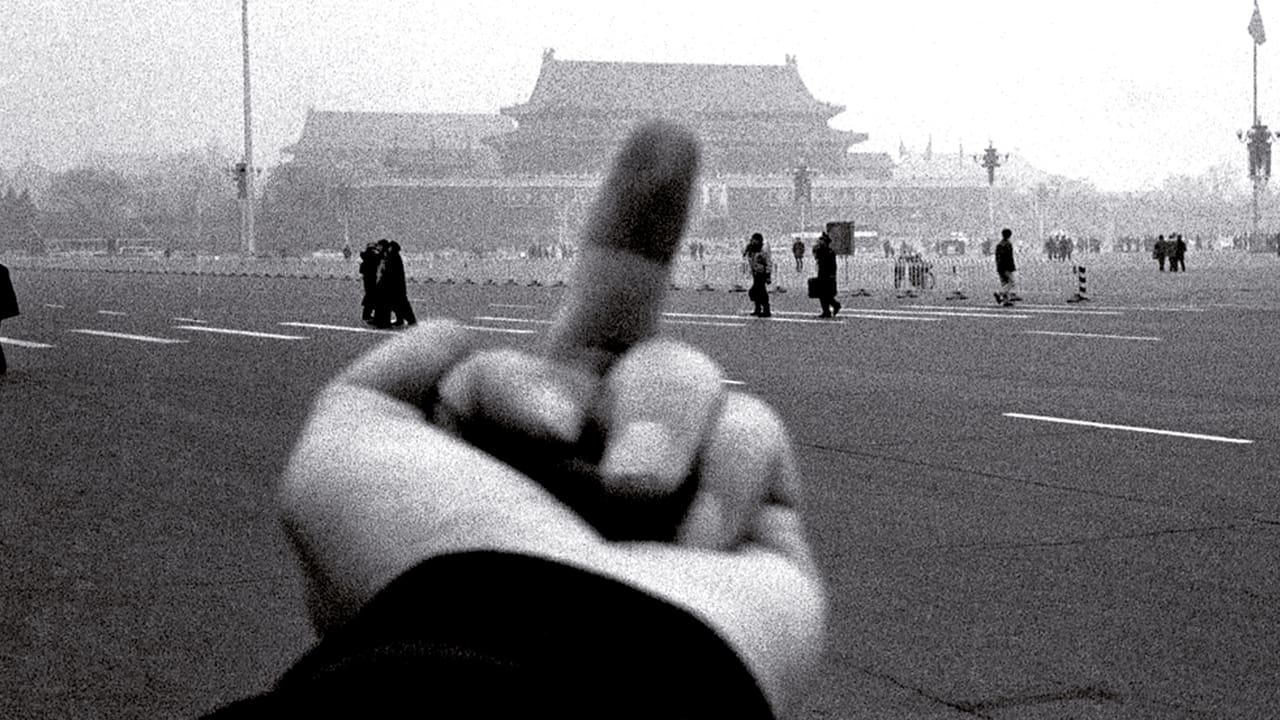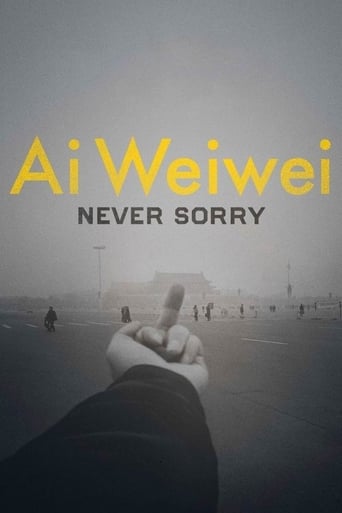

It's no definitive masterpiece but it's damn close.
... View MoreClever and entertaining enough to recommend even to members of the 1%
... View MoreClose shines in drama with strong language, adult themes.
... View MoreThere are moments that feel comical, some horrific, and some downright inspiring but the tonal shifts hardly matter as the end results come to a film that's perfect for this time.
... View MoreFor the things that people say . Sichuan appeared more or less I do not deny.But he saw only the problem,I hate , who has two sides.Two sides of things if you only care about the one hand, while ignoring the other hand , the result of the ability that you put it out is wrong.I'm sure at the people have not been to China , has been a long time have not been to China,See China in the with Decaying backward view.I can tell you , AI MO MO this man if he is in your country , you will hate .You in the West is very strong after the original capital accumulation , although China's rapid and stable development.But there is a great distance away from you,Western you with your concept of rules to measure the world has many years,Is he must be right !No, definitely not.You want the world to follow the development of your wishes , I can tell you , your power becomes increasingly weak.I can clearly tell you that your government spends much money to subvert the Chinese cause a lot of trouble to China every year, civilians die . A Soviet Union has been to topple , but China will not .We do not believe in God , we believe that our hands , I believe that the power of labor ; nor do we believe that your so-called democracy , we believe that our system . We may not be the best of peoples , but it is certainly an .Of course, some of us likeAI MO MO ,But they are small, can not keep us out into the future,Some of them will be forgotten , and some will always do nails like Jesus on the cross as shame was nailed in China. In a word, came to China to bring good meal time , in Post your comment
... View MoreI must admit I knew virtually nothing about the Chinese dissident and artist Ai Weiwei before his detention and disappearance, in 2011, which made world headlines. This documentary, directed by Alison Klayman, does a fine job of capturing the life of Weiwei, who I found to be a very brave and charismatic figure. The film, I thought, was quite inspiring to me and also quite fascinating.The opening scenes show one of Weiwei's cats, who has learned to jump high and put his weight on a door handle and open the door, which is pretty amazing. Then Weiwei in his sly humor states that cats are different than humans because they have no inclination to close a door after they've opened it.His father was a renowned poet in China, but was sent into exile for re-education for 19 years. I imagine this is where Weiwei's iconoclastic spirit began. The movie traces his 12 years in New York City, where his brilliant art conceptions took root. When the crackdown in Tiananmen Square took place, in 1989, Weiwei participated in hunger strikes and demonstrations in protest. In 1993, he returned to China to be with his ailing father, who eventually passed away three years later.Most of the documentary focuses on Weiwei's continuing struggles to achieve more freedom for the Chinese people in a very authoritarian and controlled society. He seems to be in a continual struggle with the government, which shut his blog, surveilled his comings and goings, and even did nothing when security guards beat him in a hotel room, causing his brain to swell, nearly killing him.When the Sichuan earthquake struck China there were over 5,000 children killed, mostly from poor construction of schools, per the film. While the government wanted to keep the names of those who died secret, Weiwei began to identify all the children who died and had people from around the world read one name of each child on his Twitter page, to the consternation of the Chinese government.While some of his compatriots were imprisoned for speaking out against the authorities, such as Liu Xiaobo, Weiwei had escaped that fate. Many felt this was due to his worldwide notoriety, with his shows being so popular in many countries. However, in 2011, he was detained and for nine months held in seclusion. He was eventually released and apparently has slowly resumed his actions to achieve more freedom for the people there.The movie, I thought, was quite inspiring to me, and I found Weiwei's calm but revolutionary spirit to be quite special. The film also gives the viewers a seldom seen inside look at what's going on in China today.
... View More"There are individuals who come along in certain periods of time who advance the human spirit to the next level." – actor James Newcomb Heroes are not only those who achieve unprecedented success, but those who create possibilities for others. "Breakthroughs" according to Werner Erhard, "are created by people who will act to make possibility real." Such an individual is Ai Weiwei (pronounced "Ay Way Way") a Chinese artist and political activist whom Time Magazine named as runner-up for "2011 Person of The Year." Directed by Alison Klayman, the compelling documentary Ai Weiwei: Never Sorry, winner of a Special Jury Prize at this year's Sundance Film Festival, follows Ai Weiwei pursuing his sculpture, architecture, curating, photography, film, and other arts in a political system that does not hesitate to use force, repression, and censorship against those they see as threats to the Communist government.Ai Weiwei's father was Chinese poet Ai Qing who was denounced and sent to a labor camp with his wife, Gao Ying, an event that had strong repercussions in Ai's life. Ai Weiwei lived in New York from 1983 to 1993 where he studied and worked as an artist. While in New York, he created conceptual art by altering ready-made objects. He also compiled 10,000 photographs that were shown in an exhibit at the Three Shadows Photography Art Centre in Beijing and became the subject of a 20-minute film "Who's Afraid of Ai Weiwei" shown on PBS in 2008, a work that was expanded to produce the current documentary.Using interviews with friends, family members, fellow artists, and young followers, Klayman describes Weiwei's involvement in the Sichuan Earthquake Names Project which listed the names of 5,000 student victims who lost their lives because of shoddy construction of schools, his criticism of the government's use of propaganda to support the Beijing Olympics whose Bird's Nest Stadium he helped to design, and his provocative use of humor in his exhibit using photographs showing his extended middle-finger in front of Tiananmen Square. Weiwei says, "There is no outdoor sport as graceful as throwing stones at a dictatorship." The film also documents the artist's exhibitions in Munich, especially a work called "Remembering" which displayed 9,000 backpacks spelling out the words "She lived happily on this earth for 7 years," a reference to students who were killed in the Sichuan earthquake. Another exhibit shown at the Tate Gallery in London consists of 100-million porcelain hand-painted sunflower seeds made in China. Though China claims that human rights have improved in their country, Ai Weiwei's assault by police thugs attempting to prevent him from testifying at the trial of Tan Zuoren belies the claim. Zuoren, an activist and recent Nobel Peace Prize winner, was sentenced to 11 years in prison for several articles that, according to Weiwei, were reasonable and not at all provocative.One of the most important aspects of Weiwei's activism is his use of social media, especially Twitter (@aiww), an activity that he began in earnest after his blog was taken down by the authorities. This is demonstrated by his ability to quickly organize resistance to the government's proposed demolition of his newly-built art studio in Shanghai which they deemed "illegal." Though the documentary breaks no new ground as an art form and only skims the surface of Ai's personal life, Ai Weiwei: Never Sorry is a well-made and often inspiring film about an artist who is willing to take enormous risks for his own safety to expose human rights abuses and which reaches a new level of intensity when it is discovered that Weiwei has disappeared, leading to world-wide protests and an uncertain outcome.
... View MoreI'll be honest, I am not a political activist. I am not on top of what's happening in the world or in politics both nationally and internationally. And I have one thing to say about that after seeing this movie. Shame on me! For those of you who don't know him (I didn't until this January), Ai Weiwei is a political artist and activist. He is a sculptor, a painter, a muralist and a lone spokesperson in China who opposes the oppression of his country and the lies that he feels they tell. He dares to speak his truth in what is happening behind the closed doors through his artwork and his words. This movie entranced me from the beginning with its humor and information. It was beautiful and frighteningly ugly to see Ai Weiwei's story. He was followed by a group of documentarians who filmed Ai Weiwei and interviewed those around him, from his mother to his wife, friends, and child. Ai Weiwei was depicted as a bright, articulate, and talented man who wanted to make things better for the next generation as he felt his father's generation failed him. Utilizing his art, Ai Weiwei told horrific stories of what the government has covered up. We continued to watch as Ai Weiwei pushes the governments buttons and the envelope. The government was filmed trying to intervene with Ai Weiwei's attempts to communicate what the government was doing. Internet shutdowns lead to Ai Weiwei utilizing Twitter to communicate each and every step of his drama. Brutality from the government was evident. They wanted him shut down and would do anything. Ai Weiwei's future was at stake, but he will risk everything, and I mean EVERYTHING, in order to ensure that his son will have a better future. No fictional movie could have been written to depict a stronger leader and spokesperson than Ai Weiwei. This was real life. This was a man wanting to change the world. That really puts all the rest of us to shame. We take so much for granted. The Facebook posts I see from "friends" who disagree with Obama and can say so with no fear of death or beating. Ai Weiwei didn't have that luxury. We have freedom. We take it for granted. We are spoiled. Think twice the next time you have an opinion and voice it either to a friend or on-line. There are no repercussions. Ai Weiwei wants the citizens of China to have that same freedom.This documentary was one of the most emotional, educational, yet somehow still entertaining (and sometimes funny!) documentaries I have ever had the honor of seeing. Seek out this movie. It's a limited release, but worth the drive to see it. It will change you and how you view the world. How many movies can do that?
... View More